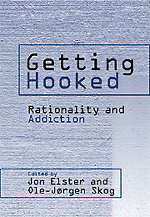Book contents
- Frontmatter
- Contents
- Preface and Acknowledgments
- Contributors
- Introduction
- Addiction and Social Interaction
- Addiction, Weakness of the Will, and Relapse
- The Dangers of Willpower
- The Neurobiology of Chemical Addiction
- To Legalize or Not to Legalize: Is That the Question?
- Rationality, Irrationality, and Addiction – Notes on Becker's and Murphy's Theory of Addiction
- Gambling and Addiction
- A Visceral Account of Addiction
- Epilogue: Rationally Coping with Lapses from Rationality
- Index
Rationality, Irrationality, and Addiction – Notes on Becker's and Murphy's Theory of Addiction
Published online by Cambridge University Press: 05 June 2012
- Frontmatter
- Contents
- Preface and Acknowledgments
- Contributors
- Introduction
- Addiction and Social Interaction
- Addiction, Weakness of the Will, and Relapse
- The Dangers of Willpower
- The Neurobiology of Chemical Addiction
- To Legalize or Not to Legalize: Is That the Question?
- Rationality, Irrationality, and Addiction – Notes on Becker's and Murphy's Theory of Addiction
- Gambling and Addiction
- A Visceral Account of Addiction
- Epilogue: Rationally Coping with Lapses from Rationality
- Index
Summary
It may seem as if addicts do not act according to their preferences. They often claim that they would like to stop doing whatever they are addicted to, but nevertheless they continue doing it. Because the minimum criterion for rationality requires that one acts according to ones preferences, this seems to imply that addicts are not rational. This question will be the main theme in this chapter. In particular, I shall introduce and critically discuss Becker and Murphy's theory of rational addiction.
I will start by giving a brief sketch of my understanding of the term “addiction” and a rough outline of Becker and Murphy's approach based on rational-choice theory (Section 1). Because the details of Becker's theory are not easily available, I try to explain the basic idea with the aid of a simplified model (Section 2) before I introduce the general model (Section 3). Section 4 provides a discussion of the nature of the phenomena captured by Becker and Murphy's model. Do they genuinely belong to the same family, or do they just superficially resemble each other – as bats and birds, sharks and whales? In Section 5, I discuss the realism of Becker and Murphy's assumptions, and in Section 6, some predictions from the theory are evaluated.
Rationality and Addiction
The hallmark of addiction is that the addicted person finds it very difficult to abstain from performing a certain sort of act. Typically, the experience of difficulty would be sensitive to the context.
- Type
- Chapter
- Information
- Getting HookedRationality and Addiction, pp. 173 - 207Publisher: Cambridge University PressPrint publication year: 1999
- 12
- Cited by

